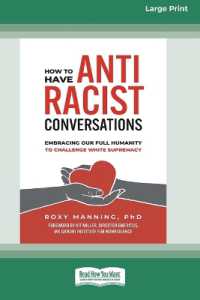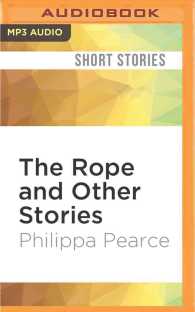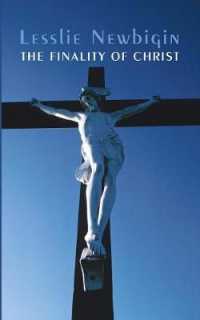- ホーム
- > 洋書
- > 英文書
- > Religion / Ethics
Full Description
In an increasingly connected world, the question of how different religious traditions relate to one another is more urgent than ever. The study of interreligious encounters and relations, by no means a new endeavor, has recently emerged as a formal multi- and interdisciplinary academic field that seeks not only to understand how worldviews and ways of life interact and intersect, but also to suggest avenues of constructive dialogue.
Interreligious Studies represents a milestone achievement, bringing together thirty-six scholars from four continents to produce ""dispatches"" on the current state of this burgeoning field. This volume probes the context, parameters, and contours of interreligious studies (IRS), including its relation to other disciplines, its promise as a field of research in secular and nonsecular contexts, its particular terminology and methodology, its civic agenda, and the various scholarly profiles of those who pursue it. Other topics taken up include historical examples of interfaith dialogue, theological and philosophical considerations of truth-seeking in interreligious encounter, and contemporary agendas such as the decolonization of the study of religion and the obligation to respond to anti-Semitism, Islamophobia, and xenoglossophobia.
Whatever possibilities IRS might hold, there first must be a working definition of the field and its praxis. Interreligious Studies points in this direction as it highlights the practical knowledge generated by IRS: how to cultivate empathy, make peace and build nations, promote scholarly activism, and foster meaningful interreligious relations. Scholars and students who are serious about engaging the many dynamic conversations blossoming within this nascent field will be well served by the contributions of this volume.
Contents
Foreword by Anna Halafoff
Preface—Hans Gustafson
1 Introduction—Hans Gustafson
Part 1. Sketching the Field
2 Area, Field, Discipline—Oddbjørn Leirvik
3 Identifying the Field of Research—Geir Skeie
4 A Civic Approach to Interfaith Studies—Eboo Patel
5 The Scholar, the Theologian, and the Activist—Marianne Moyaert
6 Lessons from a Liminal Saint—Mark E. Hanshaw
7 Interreligion and Interdisciplinarity—Jeanine Diller
8 Interreligious or Transreligious?—Anne Hege Grung
Part 2. History and Method
9 Historical Precedents—Thomas Albert Howard
10 From Comparison to Conversation—Frans Wijsen
11 Ethnographic Approaches and Limitations—Nelly van Doorn-Harder
12 Vitality of Lived Religion Approaches—Hans Gustafson
13 Empirical Approaches to Interreligious Relations—Ånund Brottveit
14 Ecumenical and Interreligious—Aaron Hollander
15 Places and Spaces of Encounter—Timothy Parker
Part 3. Theological and Philosophical Considerations
16 Grist for Theological Mills—J. R. Hustwit
17 Dialogical Theology and Praxis—Wolfram Weisse
18 Interreligious Theology and Truth Seeking—Perry Schmidt-Leukel
19 Vivekananda's Vision—Jeffery D. Long
Part 4. Contemporary Challenges
20 Decolonizing the Study of Religion—Kevin Minister
21 Decolonizing Interreligious Studies—Paul Hedges
22 Secular Imperatives—Kate McCarthy
23 (Neo)Liberal Challenges—Brian K. Pennington
24 Complicating Religious Identity—Russell C. D. Arnold
25 In Reactionary Times—Rachel S. Mikva
26 Confronting Xenoglossophobia—Caryn D. Riswold and Guenevere Black Ford
27 Kairos Palestine and Autoimmune Rejection—Peter A. Pettit
V Praxis and Possibility
28 Cross-Cultural Leadership as Interfaith Leadership—Barbara A. McGraw
29 Interreligious Empathy—Catherine Cornille
30 Howard Thurman's Mentorship of Zalman Schachter-Shalomi—Or N. Rose
31 Peacebuilding—Navras J. Aafreedi
32 Nation Building—Asfa Widiyanto
33 Scholarship as Activism—Jeannine Hill Fletcher
34 Dialogue and Christian-Muslim Relations—Douglas Pratt
35 Gender and Christian-Muslim Relations—Deanna Ferree Womack
36 Conclusion—Hans Gustafson








